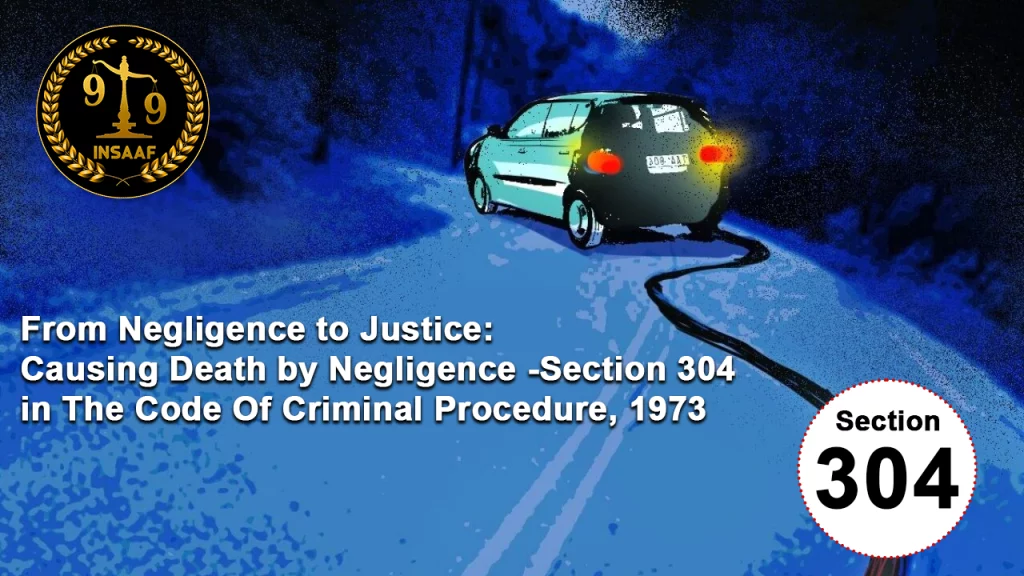

Online Legal Advice from Insaaf99® Online Lawyer Consultation in India


Online Legal Advice from Insaaf99® Online Lawyer Consultation in India

In the intricate web of India's criminal law, Section 304 of the Indian Penal Code (IPC) emerges as a pivotal force, particularly when it comes to dealing with instances of negligent causing of death. This statutory provision is designed to impose accountability on individuals whose negligence becomes the unfortunate catalyst for the loss of a life. Let us unravel the intricacies woven into Section - 304 IPC, exploring its profound implications within the broader context of The Code of Criminal Procedure, 1973.
This legal journey ventures beyond the mere articulation of laws, delving into the practical applications and implications of Section - 304, shedding light on how it weaves into the fabric of India's criminal justice system. As we navigate through its clauses and nuances, a deeper understanding of the legal landscape surrounding cases of negligent causing of death will unfold, offering insights into the delicate balance between justice and accountability.
At the heart of Section 304 lies its intrinsic distinction from murder, a crime rooted in the presence of a deliberate intent to kill. In contrast, Section - 304 addresses cases involving negligence, a concept defined by law as the absence of due care and caution, leading to foreseeable consequences such as death. This encompasses scenarios where:"
Rash or Negligent Act: The critical distinction lies in discerning between rashness and negligence. A rash act involves a willful disregard of consequences, while negligence arises from a failure to exercise due care and caution. For instance, driving recklessly represents a rash act, whereas leaving an open excavation site unguarded, leading to accidental falls, exemplifies negligence.
Culpable Homicide: If a negligent act results in death but involves the intention to cause injury or the knowledge that such injury is likely to cause death, it escalates to the more severe offense of culpable homicide under Section - 304 IPC.
Also Read: - Overhauling the Legal Landscape: Decoding India's Penal Code Amendments
Section 304 explicitly excludes cases where death results directly from intentional actions. The focal point is on unintentional consequences stemming from a failure to act with due care. This deliberate distinction serves to protect individuals from facing severe charges for genuine accidents rooted in momentary lapses in judgment, ensuring a balance between accountability for negligence and understanding the absence of intentional harm. This nuanced approach preserves the integrity of the legal system by appropriately addressing the varying degrees of culpability within the spectrum of unintentional consequences.
1. Burden of Proof: The prosecution shoulders the onus of proving, beyond reasonable doubt, that the accused's negligence directly caused the death in question.
2. Causation: A clear and undeniable link must exist between the negligent act committed by the accused and the resulting death.
3. Foreseeable Consequences: It is imperative to demonstrate that the death was a foreseeable consequence of the accused's negligent act, establishing a direct line of causation.
Section - 304A: Addresses causing death by rash or negligent act, with a maximum penalty of two years imprisonment, a fine, or both.
Section - 304B: Pertains to dowry death, where cruelty or harassment by the husband or relatives leads to a woman's death. It carries a minimum sentence of seven years imprisonment and the potential for a life sentence.

The Code of Criminal Procedure, 1973 (CrPC) assumes a pivotal role in guiding the procedural aspects of the investigation and trial of offenses, including those falling under Section - 304A. The CrPC meticulously ensures that the accused is entitled to a fair and just trial, upholding the principles of natural justice.
Investigation and Charges: Upon receiving information about an incident resulting in death by negligence, the police, under the CrPC, initiate a thorough investigation. Subsequently, charges may be filed against the accused. Clarity in these charges is essential, explicitly outlining the elements of negligence, causation, and the absence of intent.
Trial Proceedings: Throughout the trial, the prosecution is tasked with presenting compelling evidence substantiating the charges. This may encompass eyewitness testimonies, expert opinions on negligence, and relevant documentation. Simultaneously, the accused enjoys the right to a legal defense, presenting evidence and arguments to counter the prosecution's case. The CrPC serves as the compass, ensuring that trial proceedings adhere to procedural fairness, safeguarding the rights of both the accused and the pursuit of justice.
Insaaf99, an online legal consultation platform, offers indispensable assistance in cases falling under Section 304 IPC, particularly those involving death by negligence. Providing accessible legal expertise, the platform connects users with experienced professionals for expert advice, case assessment, document verification, and legal representation. Insaaf99 transcends geographical barriers, offering cost-effective and timely solutions. The platform's commitment to confidentiality ensures a secure environment for users to discuss sensitive details. In empowering individuals with knowledge and legal support, Insaaf99 plays a vital role in navigating the complexities of Section 304 IPC cases, making justice more accessible in the digital age.
Section 304 stands as a crucial pillar in holding individuals accountable for deaths caused by negligence. Understanding its nuances empowers individuals to exercise caution, avoiding actions that may lead to unforeseen consequences. However, it's crucial to acknowledge the complexity of legal interpretations. Seeking professional legal guidance is advisable when navigating situations involving Section 304, ensuring a nuanced understanding of the law and safeguarding individual rights. In legal matters where accountability intertwines with unintentional outcomes, professional advice becomes an invaluable asset in ensuring a just and fair resolution.